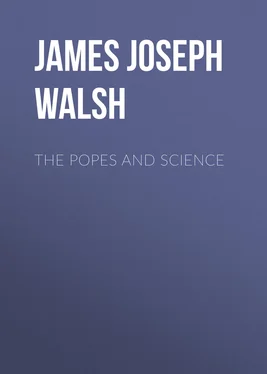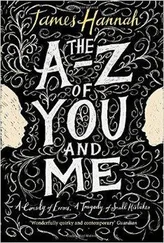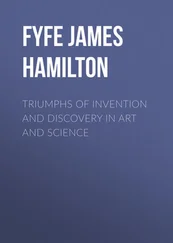James Walsh - The Popes and Science
Здесь есть возможность читать онлайн «James Walsh - The Popes and Science» — ознакомительный отрывок электронной книги совершенно бесплатно, а после прочтения отрывка купить полную версию. В некоторых случаях можно слушать аудио, скачать через торрент в формате fb2 и присутствует краткое содержание. Жанр: foreign_prose, foreign_religion, foreign_antique, на английском языке. Описание произведения, (предисловие) а так же отзывы посетителей доступны на портале библиотеки ЛибКат.
- Название:The Popes and Science
- Автор:
- Жанр:
- Год:неизвестен
- ISBN:нет данных
- Рейтинг книги:4 / 5. Голосов: 1
-
Избранное:Добавить в избранное
- Отзывы:
-
Ваша оценка:
- 80
- 1
- 2
- 3
- 4
- 5
The Popes and Science: краткое содержание, описание и аннотация
Предлагаем к чтению аннотацию, описание, краткое содержание или предисловие (зависит от того, что написал сам автор книги «The Popes and Science»). Если вы не нашли необходимую информацию о книге — напишите в комментариях, мы постараемся отыскать её.
The Popes and Science — читать онлайн ознакомительный отрывок
Ниже представлен текст книги, разбитый по страницам. Система сохранения места последней прочитанной страницы, позволяет с удобством читать онлайн бесплатно книгу «The Popes and Science», без необходимости каждый раз заново искать на чём Вы остановились. Поставьте закладку, и сможете в любой момент перейти на страницу, на которой закончили чтение.
Интервал:
Закладка:
We would not leave the impression, moreover, that it was in medicine alone that the misunderstood Middle Ages made distinct progress in science. This is true in every department of what we now call natural science. The reason for the false impression that science was not studied in the Middle Ages at the universities, is that the supposed historians of education and of science who have made such declarations have never taken the trouble to look into the works of the great writers of this period. Anyone who does so, at once changes his opinion in this matter. Humboldt, for instance, the great German natural philosopher, has given ample credit to these colleagues of his, who lived some six centuries before him, yet did such wonderful work in spite of their inadequate means and the fact that they were as yet only groping in the darkness of the beginnings of science. Whewell, the English historian of the inductive sciences, has also proved sympathetic to these old philosophers, and especially to Albertus Magnus and Roger Bacon. Those who so ignorantly but with a pretense of knowledge make little of the science of the Middle Ages, know nothing of the real accomplishments of such men as Bacon, Albertus Magnus, Thomas Aquinas, Arnold of Villanova, nor Vincent of Beauvais, the encyclopedist. As is always the case, however, the ignorance of supposed historians of science and education in this matter, has only served to emphasize the presumptuous assurance of their declarations as to the intolerance of the Middle Ages toward scientific progress. It is ever the ignorant man who has the least doubt about his opinions.
Unfortunately many students of science followed these writers apparently without a hint of the deception that was being practiced on them. Not infrequently the prestige or institutional position of the writers has been enough to carry their works into a vogue which has been heightened by the existence of religious prejudice and intolerance. Usually such motives are supposed to be far distant from the scientific mind. In this case they have been, to some degree at least, unconsciously present. There has unfortunately been a definite persuasion that there could be nothing good in the Middle Ages, and therefore there has been no surprise that evil should be found there. Perhaps there is nothing sadder in present day education, than the fact that serious students and professors of science should thus have been led astray. Nothing shows more clearly the superficiality of our education than the fact that these unfounded statements with regard to the greatest period of education in history have been so universally accepted with so little question.
A moment's consideration of the conditions in which the universities developed will show how unreasonable is the thought that the Church or the Popes were opposed to any phase of education.
It has come to be universally conceded in recent years that the Church was the great patron of art and of letters during these centuries. Without the inspiration of her teachings there would have been no sublime subjects for artists; without the lives of her saints there would have been much less opportunity for artistic expression; without the patronage of the cathedral builders, the high ecclesiastics, and above all the monastic orders, on whom, with so little reason, so much contempt has been heaped, there would have been none of that great art which developed during the centuries before what is called the Renaissance. In literature, everyone of the great national poems that lie at the basis of modern literature is shot through and through with sublime thoughts that owe their origin to the Church. We need only mention the Cid in Spain, the Arthur Legends in England, such works of the Meistersingers as Perceval and Arme Heinrich, the Golden Legend, the Romance of the Rose, and Dante,–all written during the thirteenth century alone, to illustrate Church influence in literature. This is, as we have said, admitted by all. It is supposed, however, that while the Church encouraged this side of human development, it effectually prevented the evolution of man's scientific interests.
As a matter of fact, however, the Church did quite as much for science as for literature and art and charity, There has never been any question that under her fostering care philosophy developed in a very marvelous way. The scholastic philosophers are no longer held in the disrepute so ignorantly accorded them in the last century. It is recognized that scholastic philosophy represents a supremely great development of human thinking with regard to the relations of man to his Creator, to his fellow man, and to the universe. Even those who do not accept its conclusions now, if themselves educated men, no longer make little of those wonderful thinkers, but sympathize with their magnificent work. Only those who are ignorant of scholastic philosophy entirely, still continue to re-echo the expressions of critics whose opinions were founded on second-hand authorities and who confessedly had been unable to make anything out of the scholastics themselves. This field of philosophy was the real danger point for faith and the Church, yet its study was encouraged in every way, provided the philosophers kept within the bounds of their subject.
Just exactly the same thing was true in the realm of natural science. Strange as it may seem to those who have allowed themselves to be led into thinking that only for the last century or a little more have men made observations on nature, and only comparatively recently have the conclusions which they reached with regard to natural phenomena been of any real significance, there is no doubt at all that men made great achievements in physical science in the Middle Ages, some of which unfortunately were lost sight of later, but many of which remained to form the basis on which our modern scientific knowledge has been built. In order to obtain a proper appreciation of this, all that is necessary is to study the works of the investigating scholars of the early history of the universities, and see how much that is considered very modern they anticipated in their writings. They must be read for themselves, not be judged by excerpts chosen by prejudiced readers, much less by critics who were bent on not finding anything good in the Middle Ages. There is need of sympathetic interpretation to replace the ignorant contempt which has so far dominated this period of the history of education. The precious lesson that men may learn from the unfortunate misunderstanding, however, is how much old-time prejudice still dominates the attitude even of scholars–nay, even of scientists and educators, with regard to certain periods in history.
To most people it will be utterly uncomprehensible, however, that after all that they have heard about Church opposition to science and Papal discouragement of education as dangerous to faith, there should now be an absolute denial of the supposed grounds for the assertions in this matter. Most readers, even among educated people, will be very prone to think that their impressions in these matters cannot be entirely wrong, and that previous writers on the subject cannot have been either deceiving or deceived. In all that relates to the Roman Catholic Church, however, before the date of the so-called reformation, it is important to remember that there came into existence a definite body of Protestant tradition, the creation of the reformers who wished to blacken the memory of the Old Church as much as possible to justify their own apostasy, and who therefore spared no means to pervert the facts of history or to exaggerate the significance of historical details so as to produce this false impression. Subsequent generations were oftener deceived themselves than deceiving. They were sure that the Church was opposed to education and to science, and consequently it was not hard for them to read in certain incidents and documents a meaning quite other than their actual significance, because this added meaning agreed with their prejudices on these subjects.
Читать дальшеИнтервал:
Закладка:
Похожие книги на «The Popes and Science»
Представляем Вашему вниманию похожие книги на «The Popes and Science» списком для выбора. Мы отобрали схожую по названию и смыслу литературу в надежде предоставить читателям больше вариантов отыскать новые, интересные, ещё непрочитанные произведения.
Обсуждение, отзывы о книге «The Popes and Science» и просто собственные мнения читателей. Оставьте ваши комментарии, напишите, что Вы думаете о произведении, его смысле или главных героях. Укажите что конкретно понравилось, а что нет, и почему Вы так считаете.












